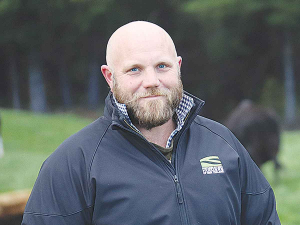Editorial: RMA reforms uproar
OPINION: The euphoria over the Government’s two new bills to replace the broken Resource Management Act is over.
 New Feds sharemilkers section chair Aaron Passey says business acumen is an area where many new sharemilkers come unstuck.
New Feds sharemilkers section chair Aaron Passey says business acumen is an area where many new sharemilkers come unstuck.
What major skill is often lacking amongst sharemilkers? Find out from Feds new sharemilkers chair.
Aaron Passey says sharemilkers need to have good business acumen if they are to succeed in the dairy industry.
He told Dairy News this is a skill that is sometimes lacking among sharemilkers and one that needs to improve.
Passey says business acumen is an area where many new sharemilkers come unstuck. They have jumped at the opportunity of entering the industry, but haven’t necessarily done background budgets. He says, if they did this, it would be clear whether they would be financially better off staying as a herd manager for a few more years rather than becoming a sharemilker.
“A lot of this is about having the skills to deal with the banks. There is a need to educate sharemilkers about the information they need to provide the banks and how to develop a good working relationship with them.
“You give yourself a better chance of success in obtaining a loan if you have good budgets and information about what security you have. But if you have a good relationship with the bank you enhance the chances of getting a proposal across the line.
“They need to do their sums and know what their profitability levels will be in different scenarios such as an adverse event or a drop in payout,” he says.
Passey says Feds, DairyNZ and the Primary ITO are all involved in various initiatives to help educate sharemilkers.
He says while many people do the various Primary ITO courses, some of the information that sharemilkers need at an early stage comes in during the more advanced courses.
He says that business training is needed much earlier.
According to Passey, skill levels required in the industry vary from farm to farm. He says on smaller farms the emphasis will be on cows and grass, while on larger units, such as those in Canterbury, business management skills are more important.
About the man
Aaron Passey and his wife Jo are currently sharemilking on a 130ha property just north west of Dannevirke in the Tararua district. They peak milk about 300 cows and the farm is over 300 metres above sea level. It is situated in a valley and the Ruahine Ranges, snow covered in winter, form a stunning back-drop.
Passey grew up in Upper Hutt near Wellington, but always had a desire to be a farmer.
“While at school I frequently visited my relations in the Manawatu who had sheep and beef farms, so it was no surprise that when I left school I went to Massey University and completed a bachelor of applied science in agriculture. After a few months driving tractors, I began my career in the dairy industry,” he says.
He initially got a job as a herd manager then managed a small dairy farm in Taranaki before coming to the Tararua district where he’s been for the past thirteen years.
It was here that he was urged by a former Feds sharemilker president, Neil Filer, to become involved in the federation and over the years he has worked his way up the ranks.
He says his new role will involve lobbying and advocating to ensure that sharemilking remains a sustainable and profitable business.
“I also want to promote and create an environment that encourages more people to take up sharemilking and enter the industry,” he says.
While Passey admits that it can be challenging moving from sharemilking to farm ownership, he wants to uncover new and creative ways of making this possible.
The Meat Industry Association of New Zealand (MIA) today announced that Chief Executive Officer Sirma Karapeeva has resigned from the role.
The winners of the 2026 Hawke’s Bay/Wairarapa Dairy Industry Awards were announced at the annual awards dinner held at Copthorne Solway Park in Masterton on Thursday evening.
Environment Southland is welcoming this week’s decision by the Environmental Protection Authority (EPA) to approve the release of Blaptea elguetai, a leaf‑feeding beetle that will help control the highly invasive Chilean flame creeper.
This March, the potato industry is proudly celebrating International Women’s Day on 8 March alongside the International Year of the Woman Farmer, recognising the vital role women play across every part of the sector — from paddocks and packhouses to research, leadership, and innovation.
Fruit trader Seeka posted a record profit and returns to shareholders in 2025.
Recent weather events in the Bay of Plenty, Gisborne/Tairawhiti, and Canterbury have been declared a medium-scale adverse event.

OPINION: A mate of yours truly reckons rural Manawatu families are the latest to suffer under what he calls the…
OPINION: If old Winston Peters thinks building trade relations with new nations, such as India, isn't a necessary investment in…